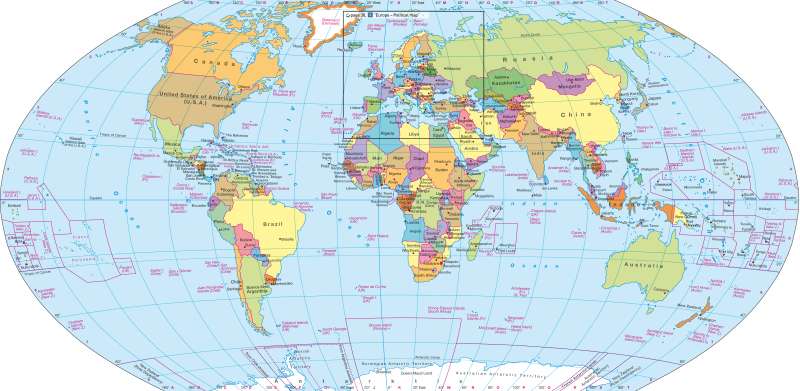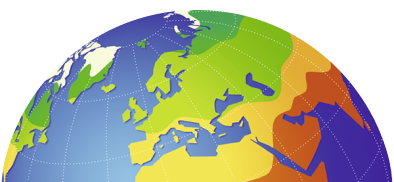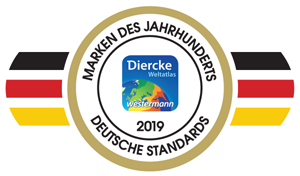The world — Political map
The world - Political
978-3-14-100790-9 | Page 188 | Ill. 1

Information
There are currently 195 states in the world. The largest states in terms of population are the People's Republic of China with over 1.3 billion inhabitants and India with nearly 1.1 billion inhabitants; in third place, a relatively long way behind, comes the USA with 296 million inhabitants. At the end of the list are the dwarf states of Nauru and Tuvalu, with just 14,000 and 10,000 inhabitants respectively, as well as Vatican City which foots the list with less than 1,000 inhabitants.The Russian Federation, which is only in seventh place in the population statistics with 143 million inhabitants, easily heads the list of the largest countries in terms of area. With a land area of 17,075 million square kilometres, Russia is a long way ahead of the states of Canada (9.98 million), USA (9.80 million) and China (9.57 million), which are similar to each other in terms of size. The countries at the end of this ranking are generally the same as those at the end of the population table with the exception of Monaco, which ranks in last-but-one place before the Vatican (0.44 km²). The Mediterranean principality has by far the greatest population density with nearly 17,000 inhabitants per square kilometre.
Countless oceanic islands are more or less autonomous components of sovereign states. Many islands in the Atlantic and Indian Oceans are still claimed today by the former colonial powers of France and Great Britain, including for example the Falkland Islands which were occupied by the Argentinean military in April 1982 but later recaptured by the British armed forces. In the Pacific too there are still some European outposts, although from the late 19th century the islands of the Pacific were mainly taken by the up-and-coming great powers of Japan and the USA. Greenland, the largest island in the world, had already been discovered by the Vikings in the Early Middle Ages, but then was largely forgotten until being resettled in the 18th century especially by Denmark. After the dissolution of the union between Denmark and Norway in 1814, Greenland together with the Faroe Islands devolved to Denmark.
The UN and its Organs
The United Nations emerged after the Second World War out of the allied coalition against the axis powers of Germany, Italy and Japan. It had an original membership of 51 nations, but meanwhile almost all states with the exception of Vatican City are members of the UN. According to its Charter of 24 October 1945 its most important objectives are the maintenance of world peace as well as the promotion of international cooperation and human rights. The General Secretary of the UN was the Ghanaian diplomat and Nobel Peace Prize laureate Kofi Annan from 1 January 1997 until 31 December 2006; he was succeeded in 2007 by Ban Ki-moon from South Korea.
The most important organs of the UN are the General Assembly, the Security Council, the Economic and Social Council, the Secretariat and the International Court of Justice in The Hague. The General Assembly, which meets at least once a year, consists of all the member states of the UN and is the central decision-making body of the UN in which every member — regardless of the size of its delegation — only has one vote. The General Assembly can discuss all matters within the scope of the UN Charter, approves the budget, appoints the General Secretary, and decides on the responsibilities of UN organs and the expulsion of member states or the accession of new ones. Its decisions are expressed in the form of resolutions.
The Security Council is the most powerful organ of the UN, and its decisions are binding on all members. The most important responsibility of the Security Council is to discuss international disputes with a view to finding a peaceful resolution. In cases of aggression by states the Council can decide on international sanctions or military enforcement, the implementation of which is entrusted to other organs such as NATO. To secure a precarious peace, the Security Council can send UN peacekeeping forces. These are currently present in 18 conflict regions around the world, especially in Africa and the Middle East, but also in Kosovo, Georgia, Afghanistan and the border zone between India and Pakistan. Since the peacekeepers are only lightly armed, their primary purpose is guaranteeing security and reorganizing the state infrastructure. The Security Council has five permanent members — USA, China, Russia, France and Great Britain — and ten non-permanent members that sit on the Council for terms of office lasting two years each. Germany, along with Japan, Brazil and India, is seeking a permanent seat.
The Economic and Social Council (ECOSOC) is subordinate to the Security Council and is the most important coordination body of the UN; its 54 members are elected by the General Assembly. ECOSOC's most important tasks are promoting social, education and health systems, economic development, and protecting human rights. For this purpose it cooperates with a large number of independent subsidiary organizations such as the Food and Agriculture Organization (FAO), the World Health Organization (WHO), the United Nations Educational, Scientific and Cultural Organization (UNESCO) and the United Nations Industrial Development Organization (UNIDO). Further programmes and funds that are coordinated by the Economic and Social Council include among others the United Nations Children's Fund (UNICEF), the World Food Programme (WFP), the United Nations Environment Programme (UNEP) and the Office of the United National High Commissioner for Refugees (UNHCR).
The International Court of Justice (ICJ) in The Hague, the highest court of the UN, adjudicates on conflicts of interest between states on the basis of international law, but only when the parties to the conflict agree in advance to comply with its rulings. The ICJ has no means to enforce its decisions, even though they are binding in international law.
The current most important financial contributors to the UN are in particular the USA, followed by Japan, Great Britain, Germany, the Netherlands and Italy. On the other hand it has mainly been economically weaker countries such as Pakistan, Bangladesh, India, Nigeria and Ghana that have provided the largest contingents of troops for peacekeeping operations in recent years.
K. Lückemeier; Ü: J. Attfield




